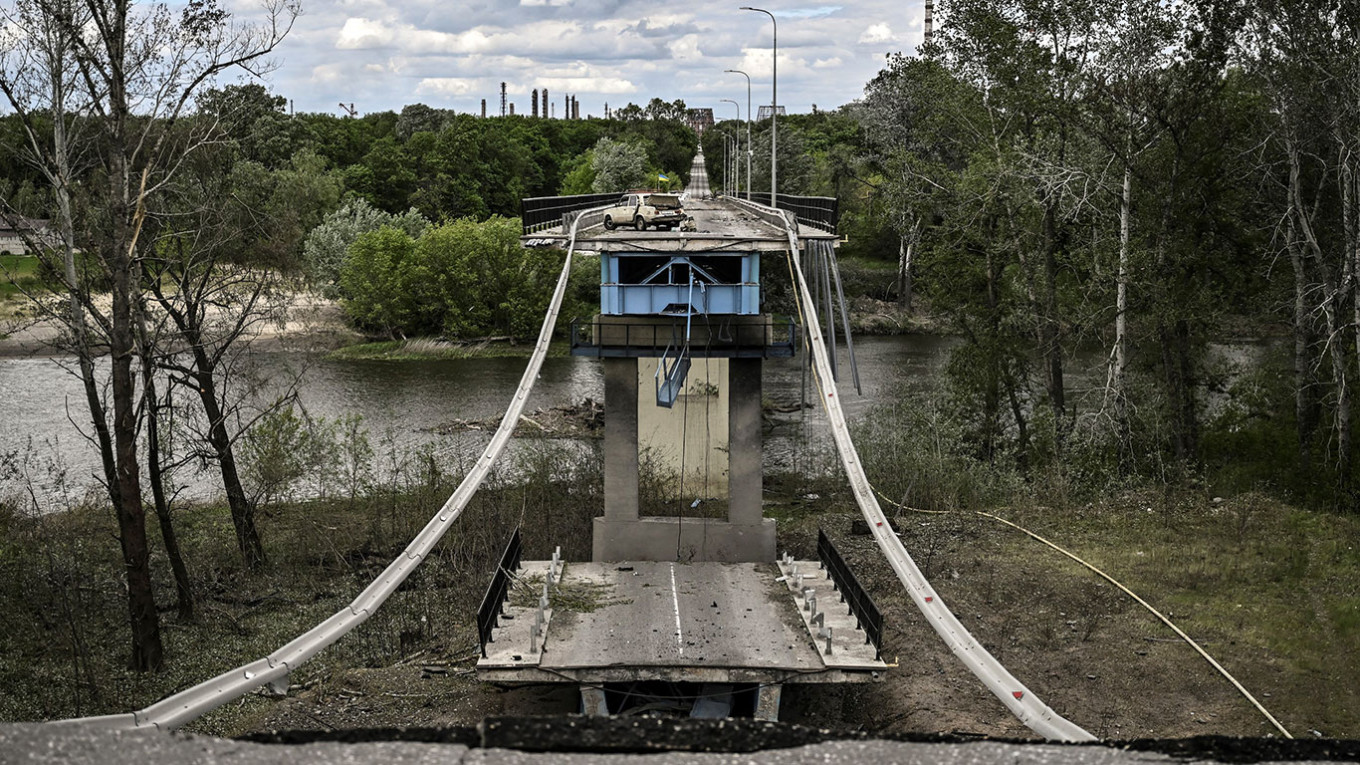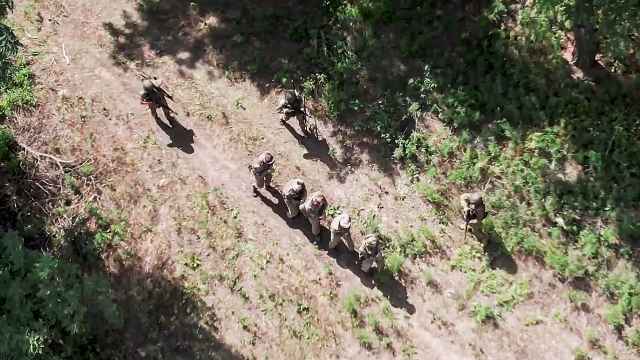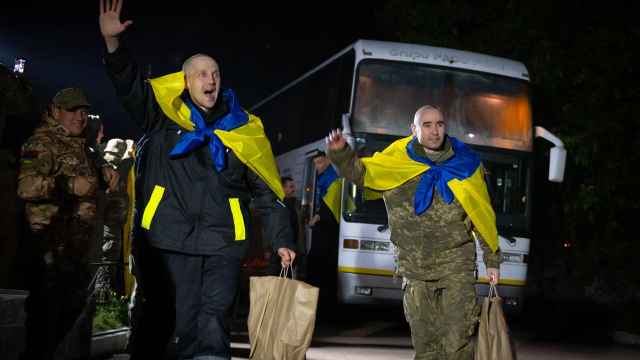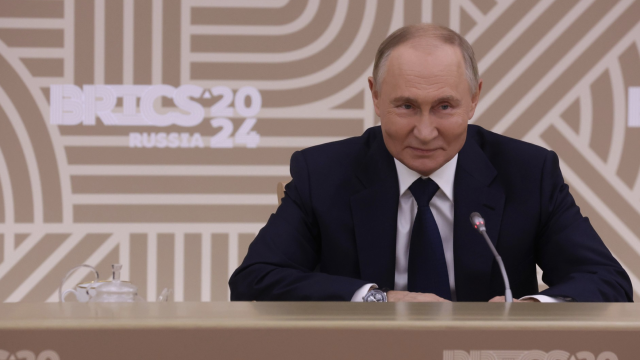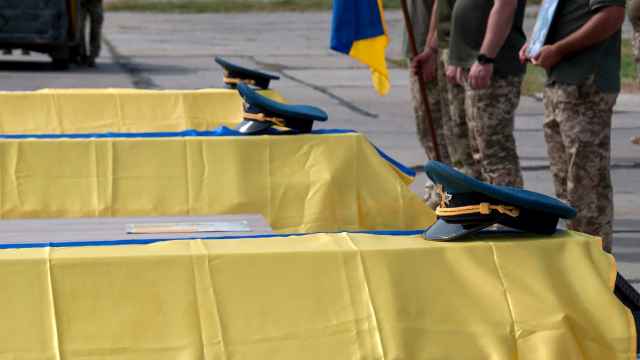Ukrainian President Volodymyr Zelensky has issued a bitter rebuke to the West for not doing enough to help Kyiv win the war, as fierce battles rage in the country's east and Russian troops draw ever closer to encircling a key industrial city.
Calling for help "without limits", specifically shipments of heavy weaponry, Zelensky also blasted recent suggestions a negotiated peace could include territorial concessions.
Outside the city of Severodonetsk, now the focal point of Moscow's renewed offensive in Ukraine's Donbas region, fighting was "very difficult," said Luhansk regional governor Sergiy Gaiday.
But the industrial center has yet to be surrounded, he said in a video posted to Telegram Wednesday.
Predicting the "coming week will be decisive," Gaiday added the city was being subjected to a "colossal amount of shelling" by Russian troops attempting to batter it into submission.
Earlier in the day, Ukrainian Foreign Minister Dmytro Kuleba told attendees at the World Economic Forum in Davos his country "badly" needs multiple-launch rocket systems to match Russian firepower in the battle for Donbas.
Zelensky echoed that plea from Kyiv.
"We need the help of our partners — above all, weapons for Ukraine. Full help, without exceptions, without limits, enough to win," Zelensky said in his daily address to the nation.
'Kissinger's calendar'
Saying the world had been unprepared "for Ukrainian bravery," Zelensky called out the international community Wednesday for paying too much attention to Russia's interests and too little to Ukraine's.
He took specific aim at former U.S. Secretary of State Henry Kissinger and the New York Times for suggesting territorial sacrifices might be necessary to end the conflict.
Kissinger, the 98-year-old champion of realpolitik, this week told World Economic Forum attendees in Davos that a return to the "status quo" before Russia's Feb. 24 invasion would be ideal.
Russia had formally annexed Crimea in 2014, while separatist groups aligned with Moscow have long controlled the easternmost regions of Donetsk and Luhansk.
Pushing Moscow to surrender that territory threatened to turn the conflict into a new, broader war, Kissinger warned, adding that negotiations needed to begin within two months.
"It seems Mr. Kissinger's calendar is not 2022, but 1938," Zelensky responded, comparing his suggestion to the agreement that ceded part of Czechoslovakia to Nazi Germany more than 80 years ago.
The New York Times editorial board also called hopes of reclaiming land seized before February unrealistic, saying eventual negotiations would present Ukrainian leadership with "painful territorial decisions that any compromise will demand."
'Clear blackmail'
Russia's Feb. 24 invasion of its pro-Western neighbor has caused global shockwaves, with the latest being fears of food shortages, particularly in Africa.
Moscow blamed the international sanctions imposed after the invasion, while the West says the shortage is mainly down to Russia's blockade of Ukrainian ports.
"Solving the food problem requires a comprehensive approach, including the removal of sanctions that have been imposed on Russian exports and financial transactions," said Russian deputy foreign minister Andrey Rudenko.
But Kuleba urged the West not to give in.
"This is clear blackmail. You could not find a better example of blackmail in international relations," Kuleba said in Davos.
Kuleba also slammed the western military alliance NATO for "doing literally nothing" to stop Russia.
'Extremely heavy shelling'
Moscow's army has plotted a slow but steady course deeper into Ukraine's eastern Donbas region since withdrawing forces from central and northern regions.
In the eastern town of Soledar, Ukraine's salt manufacturing hub, the ground shook moments after Natalia Timofeyenko climbed out of her bunker.
"I go outside just to see people. I know that there is shelling out there but I go," the 47-year-old said after a thundering blast smashed apart a chunk of a salt mine where she worked with most of her friends and neighbors.
Ghostly frontline towns like Soledar are being hammered by Russian artillery as they sit along the crucial road that leads out of besieged Severodonetsk and its sister city Lysychansk.
Twelve people were killed by "extremely heavy shelling and attacks" in the neighboring region of Donetsk, which also forms part of Donbas, the Ukrainian presidency said.
In a sign that the rest of the country remains at risk, Russian cruise missiles struck the major southern rail hub of Zaporizhzhia, killing one person and damaging dozens of houses, the presidency added.
'Here forever'
Russia is also seeking to tighten its grip over the parts of Ukraine it occupies, including fast-tracking citizenship for residents of two southern regions.
President Vladimir Putin on Wednesday signed a decree simplifying a procedure to obtain a Russian passport for residents of Kherson — which remains under full control of Russian troops — and partly occupied Zaporizhzhia.
Kyiv called plan a "flagrant violation" of Ukraine's sovereignty.
Moscow-backed officials are also pushing for formal annexation by Russia.
"The simplified system will allow all of us to clearly see that Russia is here not just for a long time but forever," Kherson's Moscow-appointed deputy leader Kirill Stremousov told Russian state media.
Underlining the human cost, about 200 bodies were found in the basement of a destroyed building in the port city of Mariupol, which fell to Moscow recently after a devastating siege, Ukrainian authorities said.
"It is impossible to be within the area due to the corpse smell," Ukrainian ombudswoman Lyudmyla Denisova wrote on Telegram Wednesday.
"The occupiers turned the entire Mariupol into a cemetery."
A Message from The Moscow Times:
Dear readers,
We are facing unprecedented challenges. Russia's Prosecutor General's Office has designated The Moscow Times as an "undesirable" organization, criminalizing our work and putting our staff at risk of prosecution. This follows our earlier unjust labeling as a "foreign agent."
These actions are direct attempts to silence independent journalism in Russia. The authorities claim our work "discredits the decisions of the Russian leadership." We see things differently: we strive to provide accurate, unbiased reporting on Russia.
We, the journalists of The Moscow Times, refuse to be silenced. But to continue our work, we need your help.
Your support, no matter how small, makes a world of difference. If you can, please support us monthly starting from just $2. It's quick to set up, and every contribution makes a significant impact.
By supporting The Moscow Times, you're defending open, independent journalism in the face of repression. Thank you for standing with us.
Remind me later.


